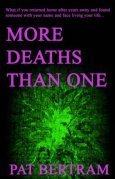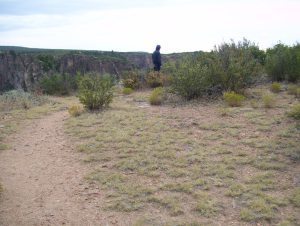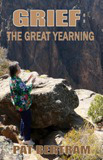Pat Bertram's Blog, page 277
March 13, 2012
What is Life? What is Death? And What do Such Questions Have to do With Grief?
 I always like when people think out loud here on my blog, when something I have said strikes an answering chord, and often when they're not sure if they are making sense, they make the most sense to me. The only good thing about my grief is that I've met some wonderful people who are struggling with the same questions I am, and I've had some thought-provoking discussions about the meaning of life, death, grief, and whether any of it matters.
I always like when people think out loud here on my blog, when something I have said strikes an answering chord, and often when they're not sure if they are making sense, they make the most sense to me. The only good thing about my grief is that I've met some wonderful people who are struggling with the same questions I am, and I've had some thought-provoking discussions about the meaning of life, death, grief, and whether any of it matters.
Leesa from Leesis Ponders believes that it does matter. She wrote on her blog:
I have spent my whole life asking if there is a god and if so what does it have to do with me.
And for me, life matters.
The search for self that blends into all matters.
The way we act towards others matters.
The way we raise our kids matters.
The way we treat the less empowered matters.
Leesa has been here with me through almost two years of grief, letting me know that my grief matters, that life matters.
In a previous post, Falling Into Grief, I wrote: Before people fall in love, they haven't a clue of its true power, and then it washes over them in a life-changing moment. Before you fall into grief, you haven't a clue of its true power, but it too washes over you in a life-changing moment, and all but drowns you. Even though I've experienced so much of what grief does to a person, I still can't believe its power. The way grief reflects falling in love as in a very dark mirror, there has to be a hormonal component. I know stress releases hormones, as does shock. Adrenaline courses through your body, and there are changes in brain chemistry that produce hormones. Your immune system goes on hold.
Leesa responded: one thing you are absolutely spot on about is that we don't know the power of falling in love nor the power of grief, nor indeed the power of love when ones baby is born until we actually experience it. The reality of life seems to be that our most intense experiences in life are about our deepest connection to each other. These experiences are life altering and this goes way beyond the DNA imperative.
For me personally then questions upon questions arise. Why is this intimate connection our deepest need, our greatest joy? What is pain about? What is the sense of being alone about? How does our idea of separating off into couples and nuclear families contribute to our sense of loss when death occurs? Why are we so interdependent on each other, on the planet on everything else. And, what is death about?
I know that many people feel they have their answers to that last question, some theologically, some via science but personally I don't. Another bunch of folk seem to think we can't answer such questions. I don't agree. I think since many of us have dumped traditional theological answers or scientific reductionist responses as inadequate we've kind of given up questioning. I think we need to keep questioning because whilst we are subject to many biochemical reactions to life events there is a deeper reality.
Of course none of this helps a person smack bang in the middle of grief. It still has to be lived through. But I'm convinced that we need to keep asking. I hope this makes sense to what you've written…I'm not sure it makes exact sense to me. I guess I just feel that once we truly understand more our experience of these events will be perceived differently…perhaps the pain will be the same but perceived differently. I'm not sure really but I am sure we don't know enough to interpret meaning yet.
Leesa's question, "What is death about?" haunts me. She's right — many people do think they know the answer, but there is no way to know for sure, which is why it's called a "belief" and not a "surety." I do think there is a deeper reality, I'm just not sure our conscious selves are a part of it. We are so much a product of our genetics, our hormones, our brains (anyone who has had to cope with an Alzheimer's sufferer or a loved one who had cancer in their brains, and found a stranger in that familiar body, knows how much the brain controls who we are), that I'm not sure how much of "us" survives.
There is a theory that our bodies are like television channels, receptors for certain wavelengths, so that our "souls" actually reside outside our bodies, but what does that have to do with life in our bodies?.
My friends laugh at me (affectionately) when I ask what we're supposed to do with eternity. We have no mouths to talk, no hands to write, no arms to hug, no eyes to read or watch movies, no legs to walk.
On the other hand, if human life is a spectrum as I postulated a few days ago, then perhaps the spectrum of a human life is the same sort of spectrum as light — beginning long before the visible part appears and ending long after the visible part disappears. Of course, the non-visible parts of the electromagnetic spectrum aren't light but sound and radiation and other invisible waves, so whatever exists outside of the visible human spectrum might be something completely different from we can ever imagine.
When I get lost in the questioning, I hold tight to Leesa's credo that such such questions matter, that life matters.
Tagged: life and death, life goes on, life matters, meaning of death, meaning of life, power of love

March 12, 2012
"Reading Pat Bertram Gets Better and Better"
 I got a wonderful review from Glenda Bixler today. She's a retired professional book reviewer who now writes about books for fun, and she loves my novels!!
I got a wonderful review from Glenda Bixler today. She's a retired professional book reviewer who now writes about books for fun, and she loves my novels!!
Glenda wrote: "I laughed with Pat while reading Daughter Am I, was scared by what happened in A Spark of Heavenly Fire, sighed with Pat's Light Bringer (Click to read my reviews of the other books!)
"But, Wow! I sat in amazed suspense as I read More Deaths Than One . . .
"The first reason I was amazed was that each of Pat's books are so uniquely different, The second was that, for me, this, last book was a mystery/suspense — my preferred reading — and therefore the most enjoyable . . . so far! I do hope she continues writing! Her imagination and creativity is exciting and diverse — readers may not be able to rely on what each book will cover, but we can be sure that it will be top rate!" (Click here to read the rest of the review: "Reading Pat Bertram Gets Better and Better")
Ahhh . . . balm to a writer's soul.
Some people hated the way I ended the book, thinking I should have shown Bob discovering all that had been done to him, but to me, the story has always been about Bob and Kerry and how they dealt with each other during the terrible revelations. If they had interviewed the perpetrator themselves, the relationship would have been between them and the interviewee. Any interaction between the two of them would have been delayed, and hence would not have had the same impact. By using an admittedly passive third party device, I could concentrate on Bob and Kerry and how the truth affected their relationship in the moment.
And Glenda got it. She wrote:
"One decision by the author proved to end this story in a unique way, one that responded to the need to provide a satisfying conclusion without going into the gory details that took place. The surprise ending was not totally unexpected, since the writer had shown us over and over that there was something strange going on . . . But I had no clue what it was until the last major revelation was made . . . Leaving out the action of those final days or weeks, leaves the reader with the romantic suspense as the primary plot line One that is memorable and, at the same time, allows us to get past what actually happened . . . which was too horrendous to dwell on. Kudos to Pat Bertram for effectively presenting this strange but plausible tale! If you've already read Bertram, you should consider this a must-read! Highly recommended!"
Click here to read the first chapter of: More Deaths Than One
Tagged: Glenda Bixler, More Deaths Than One, mystery/suspense, Pat Bertram, review of More Deaths Than One








March 11, 2012
Falling into Grief
 I wonder how much of grief is hormonal. I often think of the young women who have their lives mapped out, want to accomplish so much, are on the fast track to success and then . . . whap. They meet the love of their life, and all of a sudden, their lives, their plans, their dreams all change. Those sex/nesting/procreating hormones are so powerful, they can derail your life, make you see things in a different light, make you do things you would never do. Women who never wanted kids start dreaming of cradling sweet-smelling bundles, look for houses in neighborhoods with good schools, invest in SUVs. People call this maturity, but basically, it's just hormones and preprogrammed DNA kicking in. After all, in terms of genetics and evolution, we are just DNA machines, and everything works together to make sure we do our duty.
I wonder how much of grief is hormonal. I often think of the young women who have their lives mapped out, want to accomplish so much, are on the fast track to success and then . . . whap. They meet the love of their life, and all of a sudden, their lives, their plans, their dreams all change. Those sex/nesting/procreating hormones are so powerful, they can derail your life, make you see things in a different light, make you do things you would never do. Women who never wanted kids start dreaming of cradling sweet-smelling bundles, look for houses in neighborhoods with good schools, invest in SUVs. People call this maturity, but basically, it's just hormones and preprogrammed DNA kicking in. After all, in terms of genetics and evolution, we are just DNA machines, and everything works together to make sure we do our duty.
Grief does the same thing. It makes us see things in a different light, makes us want things we'd never thought about, derails all our plans, makes us do and feel things we never thought possible. Changes us. People think grief is a choice, but it isn't — it's something that's thrust on us. There is no way we can choose to feel things we never imagined possible. I thought grief was a quiet melancholy, a sweet nostalgia, a pervasive sadness. Grief, for me was none of those things. (Well, that's not strictly true — it's how I felt when my brother and my mother died, but did not at all resemble how I felt after my life mate/soul mate died.)
A friend of mine wrote me: I have done therapy for 40 years. I have worked with people who have lost kids, spouses, parents, dogs everyone and every kind of pet. I had NO clue what it was really like in spite of losing my best friends and parents. I think a therapist who counsels someone in grief should have gone through a loss like you and I have before she/he tries to help someone. God knows there are enough of us out here who REALLY know grief. NOW I am one of them. (I hope she doesn't mind I passed this on, but it is too important to keep to myself.)
Before people fall in love, they haven't a clue of its true power, and then it washes over them in a life-changing moment. Before you fall into grief, you haven't a clue of its true power, but it too washes over you in a life-changing moment, and all but drowns you. Even though I've experienced so much of what grief does to a person, I still can't believe its power. The way grief reflects falling in love as in a very dark mirror, there has to be a hormonal component. I know stress releases hormones, as does shock. Adrenaline courses through your body, and there are changes in brain chemistry that produce hormones. Your immune system goes on hold.
Do our bodies know we are no longer mated and ratchet back the DNA machine? I do know there is some effect on the limbic system. The lizard brain, which has been slumbering peacefully beneath our consciousness, wakes up and screams, "What?? I could die?? Say it isn't so!" That's a bit fanciful, so many of us feel it deep inside, the hurt of an animal who suddenly realizes there is an end. (As if there isn't enough to contend with when if comes to grief.)
I don't suppose it really matters what causes the physiological changes of grief — hormones, stress, agony, lizard brains. The primary cause is what matters. Someone we were deeply connected to died, and we fell into grief.
Tagged: grief, grief and love, grief's power, hormones, lizard brains, stress hormones








March 10, 2012
Dealing With Grief After a Loved One's Long-Term Illness
 There are so many misconceptions about grief that still, after two years of being steeped in the culture of the bereft, I am surprised by people's comments. I met a woman the other day who asked about my experiences with the death of my life mate/soul mate, and when I told her that he had been sick for many years, she said, "It must have been a lot easier for you than if he had died suddenly in a car accident or something." Um . . . no.
There are so many misconceptions about grief that still, after two years of being steeped in the culture of the bereft, I am surprised by people's comments. I met a woman the other day who asked about my experiences with the death of my life mate/soul mate, and when I told her that he had been sick for many years, she said, "It must have been a lot easier for you than if he had died suddenly in a car accident or something." Um . . . no.
All deaths bring trauma to the survivors, and you cannot compare relative severities. If someone dies suddenly, the survivors have to deal with unbelievable shock, with the dreadful chores of laying the dead to rest, with the after effects of the loss, with the despair of not having been able to say good-bye, with finding hurtful troves of personal belongings that the deceased would have gotten rid of if they had known they were dying, and probably dozens of other issues of which I am unaware.
If someone dies after a prolonged illness, you still have the shock. Even though you know the person is dying, you get used to it. Their dying becomes a fact of your life, and you just somehow assume that is the way it will always be — their dying, your struggling to live despite it. And when they die, it comes as an unbelievable shock. And, as with any death, the total goneness of the person adds to the confusion and shock. You expected to feel the same way when they were gone as you always did, because, after all, you'd been preparing yourself for years for that eventuality. But you don't feel the same, you don't feel any way you could ever have imagined. The onslaught of physical/emotional/spiritual trauma is the same as if he had died suddenly, because all death is sudden. He is alive and then a fraction of a second later, he is dead. There is no in between state. And there is no way to prepare yourself for his total goneness. Nor is there any way to prepare yourself for the reactions of your body and mind. These reactions come without your knowledge, your consent, or your inclination.
Afterward, of course, you have to deal with the chores of laying the dead to rest and with the effects of the loss. Sometime you have to deal with the despair of not having been able to say good-bye — often doctors hold out hope, wrongly assuming they are doing you a service, when in fact the truth would have been more compassionate. At the very least, you'd have had a chance to say good-bye. This might not seem like much to those who have not suffered a grievous loss, but I did have a chance to say good-bye, and it brought me enormous comfort over the past couple of years. I cannot imagine the pain of not being able to say good-bye or saying one last "l love you" or hugging one more time. Those are moments that are stolen from so many bereft, moments that can never be captured.
Those whose loved ones take many years to die end up with all sorts of traumas and issues because of the long dying. You hate yourself for having taken his dying for granted. You are appalled at yourself for all the times you got angry at or irritated by his infirmities. You feel guilty that you held fast to your own life while his seeped away. You wish you could recall every impatient word, every bristling stance, every horrible thought. (I remember once wishing he'd just die and put us both out of our misery. It was a fleeting thought, and understandable, but still, I wish I'd been less human at that moment and more humane.) All of these traumas add to your grief, because each has to be acknowledged, understood, forgiven.
If your mate died after suffering a long time, you do have the scant comfort of knowing he is no longer in pain, but you also have to deal with the agonizing corollary that he shouldn't have had to suffer at all.
Even if it were easier to deal with death after a prolonged illness rather than a sudden death, (or vice versa) the truth is still the same, and still unbearable. He is dead, and there's not a damn thing you can do about it.
Tagged: dealing with grief, grief and shock, long illness, saying goodbye to the dead








March 9, 2012
Saying "Yes" to Life, and to Steampunk
 I've been invited to participate in another collaborative novel, similar to the Rubicon Ranch project, only instead of a thriller, this collaborative effort will be steampunk.
I've been invited to participate in another collaborative novel, similar to the Rubicon Ranch project, only instead of a thriller, this collaborative effort will be steampunk.
I don't know anything about steampunk. Know even less about the Victorian era. And know less than less about steam-driven machinery. So, of course, I agreed to do the project.
I crave anything that is different from what I know — different tastes, different experiences, different challenges. Ever since the death of my life mate/soul mate, it seems a waste (or a stagnation) to do what he and I always did. He might be moldering in the grave (or rather in a funerary urn) but it's a disservice to both of us if I molder, too.
John Berryman wrote:
A voice calls, "Write, write!"
I say, "For whom shall I write."
And the voice replies,
"For the dead whom thou didst love.
This quatrain could just as easily exhort, "Live, live for the dead whom thou didst love."
Sometimes it feels as if this is still our life — his and mine — only I am here and he is . . . wherever. Perhaps I'm here to live for both of us. Or maybe, now I'm here to live just for me.
When we met, I was at my most spontaneous. Something about his being in the world made it seem as if life were full of possibilities, and I grabbed hold of life with both hands and ran with it. Years later, as he got sicker, as life took its toll on our finances, and the possibilities shrank, our lives became staid and planned to take his infirmities into consideration. He told me once he regretted that the constraints of our life destroyed my spontaneity, and he was sorry to be the cause of it.
It's not something I like to face, but the last years, and especially the last months of his life were terrible for both of us. And, something I like to face even less is that his death set me free. The best way to honor my mate's life and his great gift of freedom is to take back the thing he thought he stole from me, so I've been practicing spontaneity. Which means, saying yes to challenges. Saying yes to life. Saying yes to steampunk
So why steampunk? Why not? I'm a writer. I can fake it. I've also got the internet with all its research capabilities to help me. And it's something I would never have considered writing. All good reasons.
Wikipedia defines steampunk as "a sub-genre of science fiction, fantasy, alternate history, horror, and speculative fiction that came into prominence during the 1980s and early 1990s. Steampunk involves a setting where steam power is widely used — whether in an alternate history such as Victorian era Britain or "Wild West"-era United States, or in a post-apocalyptic time — that incorporates elements of either science fiction or fantasy."
In "How Do I Write A Steampunk Story?" Dru Pagliassotti says, "Steampunk fiction consists of two elements — the steam, or gaslamp aesthetic, iconography specific to the genre — and the punk, a critical ideology or political stance that satirizes, challenges, or subverts societal trends."
Kat Sheridan, a friend who took a steampunk writing class wrote me, "Remember, steampunk is all about breaking the rules and throwing conventions out the window!"
Should be fun. I'll let you know how it goes.
Tagged: becoming spontaneous, collaborative novel, For whom shall I write, honoring death, seeking challenges, steampunk








March 8, 2012
The Shoulder Season of Grief
 I had a rough time around the publication of my new book, Grief: The Great Yearning, due partly to the fact that the story of me and my life mate/soul mate has been told and is now contained between the covers of a book, and partly to the realization once and for all that he is never coming back. I already knew that of course, knew it from the moment he died, and I came to that same realization dozens of times afterward, but this time I reached rock bottom of acceptance, and it took. Surprisingly, the last couple of days have been good ones. My emotional state evened out, and I felt light. It wasn't just that my grief took a hiatus, but also that my anger had dissipated. I've been angry for so long, since way before he died, that it became my default state. Because of that, I didn't even realize I've been angry.
I had a rough time around the publication of my new book, Grief: The Great Yearning, due partly to the fact that the story of me and my life mate/soul mate has been told and is now contained between the covers of a book, and partly to the realization once and for all that he is never coming back. I already knew that of course, knew it from the moment he died, and I came to that same realization dozens of times afterward, but this time I reached rock bottom of acceptance, and it took. Surprisingly, the last couple of days have been good ones. My emotional state evened out, and I felt light. It wasn't just that my grief took a hiatus, but also that my anger had dissipated. I've been angry for so long, since way before he died, that it became my default state. Because of that, I didn't even realize I've been angry.
For many years, we sustained loss after loss — his health, our business, security — and finally, his life. So many reasons to be angry. I haven't been furious or enraged, just a quiet anger that went soul deep. So, why did the anger leave me, even if only temporarily? I don't know. Perhaps because the realization he is never coming back brought the knowledge that the past really is the past. Or perhaps this is simply the latest stage of my grief, a letting go. Or perhaps it's because spring is almost here.
Whatever the reason, I no longer fear the third year of grief. I expect to experience grief upsurges, but for the most part, I think I'll be entering the shoulder season of grief.
In the travel business, the time between the high season and the low season is called the shoulder season. I'm coming up on the two-year anniversary of his death. I will probably have some unbearably sad days as the date approaches, but after the anniversary, I could be entering a time of not-grief but not non-grief, either, a bit of a shoulder between the wildness of my early grief and the road to the rest of my life.
I still don't know what I'm going to do with my life, but I feel a quickening of interest. If I let myself, I still panic at the thought of growing old alone, of being old alone, of dying (although the idea of being dead doesn't bother me, dying does — it can be a terrible thing) but I still have many good years left. I actually might accomplish something. Or not. I'm not sure if I want to "do" or if I want simply to "be". I do have a new philosophy, though — the platinum rule. If the golden rule is to treat others the way you would want them to treat you, then the platinum rule is to treat yourself the way you would want others to treat you. So, I intend to be kind to myself, to be patient with my deficiencies, to be proud of my accomplishments. And I intend to encourage myself to be bold and adventurous.
Sounds like a good beginning to my shoulder season of grief.
Tagged: grief, Grief: The Great Yearning, loss, Second anniversary of grief, shoulder season, third year of grief








March 7, 2012
Shamrock-N-Sirens Readers' Event Introduces . . . Me!
12 Day Reader's Event SHAMROCKS-N-SIRENS
Click here for all the contests and a chance to win a set of special mugs:
SHAMROCKS-N-SIRENS … AN IRISH EVENT!!!
I am participating in a twelve-day readers' event in celebration of St. Patrick's Day. My day to be interviewed is today, so please stop by 12 Day Reader's Event SHAMROCKS-N-SIRENS Welcomes Featured Author Pat Bertram (or if you're leary about entering a non-G rated site, you can see the interview at Pat Bertram, Author of "Daughter Am I".
I answer questions with world-shaking impact, such as where and when I do my writing, how I write, my favorite quote, and what thing I would never leave behind were I to attend a St. Patrick's Day party.
And best of all,
From now until March 18, Daughter Am I is on sale for $2.99 on Kindle at: Amazon
*
Tagged: Daughter Am I, Pat Bertram, SHAMROCKS-N-SIRENS, the writing process, thriller 







March 6, 2012
Grief: Love or Codependency?
 Heavy winds today reminded me of a walk I took thirty-five years ago. (Weird, huh? Hadn't thought about that day in a very long time.) It was a lovely spring evening, or rather, it would have been if it weren't for the winds. But I was too restless to stay inside. This was about six months after I met the man I would spend the next few decades with, and like a homing pigeon, I headed for his store even though I knew he wouldn't be there. I wanted to feel connected to him, even if in such a minor way.
Heavy winds today reminded me of a walk I took thirty-five years ago. (Weird, huh? Hadn't thought about that day in a very long time.) It was a lovely spring evening, or rather, it would have been if it weren't for the winds. But I was too restless to stay inside. This was about six months after I met the man I would spend the next few decades with, and like a homing pigeon, I headed for his store even though I knew he wouldn't be there. I wanted to feel connected to him, even if in such a minor way.
When you fall in love, such bits of silliness are expected and excused. Apparently, they are understandable in the context of new love. But when you spend a lifetime with someone, and you still have that connection, people start looking askance, thinking that perhaps you're codependent. And when he dies, leaving you feeling as if half of you died, too, then the pointing figures become more . . . pointed.
A few days ago I posted my latest chapter of the collaborative novel Rubicon Ranch that I'm writing with eight other authors. In my chapter, I wrote:
Tears welled up in her eyes as she remembered her husband when they first met. His hazel eyes had blazed with golden lights as he smiled at her, and young fool that she'd been, she'd been dazzled. They had a great life, or so it had seemed. She'd felt safe with him as they traveled the world over. And free. What need had she of a house, a car, kids when she had him?
Well, now she had nothing but debts. And doubts. Had Alexander ever loved her as she loved him?
Today I had a bizarre little exchange with a total stranger. He wrote: "This excerpt suggests your 'young' lady may benefit from CODA; this is like AA for Co-dependency; a peer support group[P2P] that provides support for individuals struggling to devise[and adhere to] a recovery plan[WRAP]."
I responded: "Maybe she simply loved her husband. Not all people who are deeply connected to another human being have codependency issues. Her surviving her spouse's suspicious death confuses the matter, makes her wonder what was real. Perfectly normal behavior under the circumstances. Grief skews one's perceptions."
His response: "Kinda my point! How do we define for ourselves what is real love, or a symptom of dependency? …define for ourselves who is grieving; who is stuck in this codependency conundrum?"
There is no codependency conundrum here. Just because two human beings are depending on each other for love and support, it does not make them a therapist's subject. And even if only one of the parties is in love, as might be the case in my story's scenario, it still doesn't make the one who loves codependent. Unrequited love is still love.
It's very simple. Love means wanting what is best for the other. You help each other grow. You never expect the other to fix your individual problems, though you often take each other's advice. You don't cling, demand, or base your relationship on unrealistic expectations. Together you provided a safe environment where each can be yourself. And you support each other any way you can. No matter how connected you feel or how bereft you are when your mate dies, if the relationship helped make you grow, made you a better person, it is not codependency no matter how it appears to outsiders.
Admittedly, this exchange was about a character in a book, but I've had similar conversations with people about my grief, as if grieving for a life mate/soul mate is somehow . . . sick. As if it makes me un-well-adjusted. The truth is, I am very well adjusted, so much so that I've been willing to make my grief public in an effort to spread the word that it is okay to grieve.
And it is okay. Don't let anyone blow off your grief.
Tagged: codependency, death, grief, loss, love, Rubicon Ranch, unrequited love








March 5, 2012
Introduction to "Grief: The Great Yearning"
 Grief: The Great Yearning
, the book about my first year of grief has finally been published. I wrote this article during the summer following my life mate/soul mate's death, long before I ever knew my writings about grief would be published, but with the addition of the last paragraph, it made the perfect introduction to the book. Grief: The Great Yearning is available from Amazon, Second Wind Publishing, and in various ebook formats from Smashwords.
Grief: The Great Yearning
, the book about my first year of grief has finally been published. I wrote this article during the summer following my life mate/soul mate's death, long before I ever knew my writings about grief would be published, but with the addition of the last paragraph, it made the perfect introduction to the book. Grief: The Great Yearning is available from Amazon, Second Wind Publishing, and in various ebook formats from Smashwords.
Death came in the spring.
At the beginning of March, the doctors said that Jeff, my life mate—my soul mate—had inoperable kidney cancer and that he had six months to live. He had only three weeks. We'd spent thirty-four years together, and suddenly I was alone, unprepared, and totally devastated. I couldn't even begin to comprehend the wreckage of my life. It wasn't just he who died but "we." There was no more "us," no more shared plans and dreams and private jokes. There was only me.
Other losses compounded the misery. I had to sort through the accumulation of decades, dismantle what was left of our life, move from our home. We bereft are counseled not to make major changes during the first year after a significant loss—one's thinking processes become muddled, leaving one prey to faulty logic and rash decisions—but I needed to go stay with my father for a while. Although he was doing well by himself, he was 93 years old, and it wasn't wise for him to continue living alone.
I relocated from cool mountain climes to the heat of a southwestern community. Lost, heartbroken, awash in tears, I walked for hours every day beneath the cloudless sky, finding what comfort I could in the simple activity. During one such walk, I turned down an unfamiliar city street, and followed it . . . into the desert.
I was stunned to find myself in a vast wilderness of rocky knolls, creosote bushes, cacti, rabbits, lizards, and snakes. I'd been to the area several times during my mother's last few months, but I'd spent little time outside. I hated the heat, the constant glare of the sun, the harsh winds. After Jeff died, however, that bleak weather, that bleak terrain seemed to mirror my inner landscape. Wandering in the desert, crying in the wilderness, I tried to find meaning in all that had happened. I didn't find it, of course. How can there be meaning in the painful, horrific death of a 63-year-old man? I didn't find myself, either. It was too soon for me to move on, to abandon my grief. I felt as if I'd be negating him and the life we led.
What I did find was the peace of the moment.
Children, most of whom know little of death and the horrors of life, live in the moment because they can—it's all they have. The bereft, who know too much about death and the horrors of life, live in the moment because they must—it's the only way they can survive.
During the first year after Jeff's death, I lived as a child—moment to moment, embracing my grief, trying not to think about the future because such thoughts brought panic about growing old alone, trying not to think about the past because such thoughts reminded me of all I had lost.
And so went the seasons of my soul. The spring of death gave way to the summer of grief, and grief flowed into the fall and winter of renewal.
Grief: The Great Yearning is not a how-to but a how-done, a compilation of letters, blog posts, and journal entries I wrote while struggling to survive my first year of grief. As you journey through grief, I hope you will find comfort in knowing you are not alone. Whatever you feel, others have felt. Whatever seemingly crazy thing you do to bring yourself comfort, others have done. And, as impossible as it is to imagine now, you will survive.
Tagged: death, death of a soul mate, desert, Grief: The Great Yearning, loss, surviving grief

March 4, 2012
Rubicon Ranch: A Collaboration
 Rubicon Ranch is a collaborative novel I am writing online with eight other Second Wind authors.
Rubicon Ranch is a collaborative novel I am writing online with eight other Second Wind authors.
A little girl's body has been found in the wilderness near the desert community of Rubicon Ranch. Was it an accident? Or . . . murder! But who would want to kill a child? Everyone in this upscale housing development is hiding something. Everyone has an agenda. Everyone's life will be different after they have encountered the Rubicon. Rubicon Ranch, that is.
If you haven't yet checked the story out, you can find what we've written so far at: Rubicon Ranch. Here is the current chapter, told from the point of view of my character, Melanie Gray, a recent widow who found the child's body.
Melanie had taken the long way home from the restaurant, winding for hours through Rubicon Ranch, stopping to shoot exotic blooms in landscaped gardens and dainty wildflowers in unkempt yards. By the time she reached Tehachapi Road, she was exhausted. She half expected the sheriff to come after her, but apparently he'd accepted her brush-off as final — if you can call a full-fledged tantrum a brush-off.
Why did he keep getting under her skin? He wasn't her type. Not that she had a type. Alexander was the only man she'd ever loved, and she'd fallen for him so hard she could still feel the bruises twenty-three years later.
Tears welled up in her eyes as she remembered her husband when they first met. His hazel eyes had blazed with golden lights as he smiled at her, and young fool that she'd been, she'd been dazzled. They had a great life, or so it had seemed. She'd felt safe with him as they traveled the world over. And free. What need had she of a house, a car, kids when she had him?
Well, now she had nothing but debts. And doubts. Had Alexander ever loved her as she loved him?
"Are you okay?"
The voice startled Melanie. She scrubbed away her tears and looked around. An old woman with tan, leathery-looking skin and dark eyes shaded by a wide-brimmed straw hat was standing by an open mailbox, envelopes clutched in her hand.
"Are you okay?" the woman repeated as she closed the mailbox.
Melanie curved her lips in what she hoped was a friendly smile. "I'm fine. Just hot."
The woman brushed a forearm across her brow. "Too hot for this time of day, that's for sure. Tomorrow is supposed to be even hotter if you can imagine that. Well, at least all this sweat is good for the complexion. Keeps one looking young."
Laughing, the woman minced up the sidewalk to her front door.
Melanie let the smile drop from her face, glad she didn't have to pretend to be amused at the woman's feeble joke. Nothing amused her any more. Not the irony of Alexander dying while texting. He hated texting. Said it was creating a new language and a cult of idiocy. Not the sheriff and his unsubtle attempts at flirtation. Not finding a little girl stuffed in a television set. Had that been someone's idea of a joke? A fitting resting place for a child who watched too much television?
She hastened up Tehachapi, but her footsteps slowed as she reached Delano Road. This neighborhood had never been welcoming, but now it felt threatening, as if unseen storm clouds were gathering above the custom-made houses.
Maybe, finally, the sheriff was going to investigate the murderer instead of investigating her. Maybe, finally, he was going to turn his predatory gaze in the right direction.
She almost felt sorry for the villain.
Tagged: collaboration, collaborative novel, fiction, mystery, Rubicon Ranch, Second Wind Publishing












